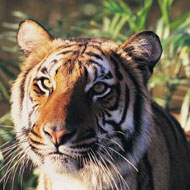
Kaziranga wildlife park comes under constant attack from poachers
An official visit by The Duke and Duchess of Cambridge to a wildlife reserve in India has reignited the debate over the park’s policy of shooting suspected poachers.
Bordering the Brahmaputra river in north-east India, the Kaziranga national park is highly regarded by conservationists. Not only does it hold two-thirds of the world’s remaining one-horned rhinos, but it also has the highest density of tigers in any protected area.
But despite the park’s good reputation of protecting endangered wildlife, it comes under constant under attack from armed poachers, who can earn up to $20,000 for a single horn. While its many guards successfully deter much of the poaching, the Kaziranga has become notorious for its controversial policy of “shoot-to-kill”.
According to figures published by the Indian government, 66 suspected poachers were killed by guards in the park between 2005-2012 and over 500 were arrested.
In a statement, Stephen Corry from Survival International, said that local tribal people are becoming increasingly caught up in the 'militarization' of wildlife policing around the world.
“This is the perfect opportunity for Prince William to speak out against summary executions carried out in the name of conservation. Extrajudicial killings should have no place in conservation today.
“Why aren’t the big conservation organisationsloudly condemning this kind of knee-jerk brutality? Instead, they’re supporting anti-tribal conservation policies, which play right into the hands of the gangsters who are running international poaching rings. Targeting tribespeople diverts action away from tackling the true poachers. Itharms conservation.”
But Bishan Signh Bonal, who was head of Kaziranga national park last year, has defended the policy. Speaking to Indian magazine Sanctuary Asia in 2015, he said:
“Our determination and almost religious belief that protecting the rhino is the only reason to live. It’s open war when poachers enter Kaziranga. If they see our guards, they fire to kill, so we have no option but to retaliate. As many as 66 poachers lost their lives over a 15-year period and more than 500 were arrested for poaching. We recovered more than 70 rhino horns. You can well imagine how much stress all this involves.”
But conservation groups like the International Animal Rescue Foundation believe that shoot-to-kill must the very last policy, and should only be considered if every other option has been exhausted.
The Duke and Duchess of Cambridge visited the Kaziranga national park on Wednesday (13 April) where they were taken on an open-top safari.
Their visit forms part of a seven-day tour of India and Bhutan.



 The BSAVA has opened submissions for the BSAVA Clinical Research Abstracts 2026.
The BSAVA has opened submissions for the BSAVA Clinical Research Abstracts 2026.